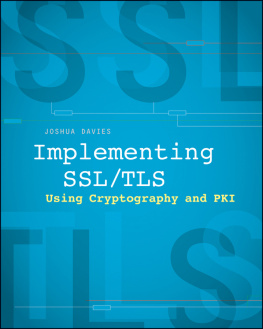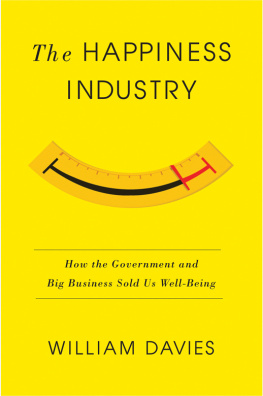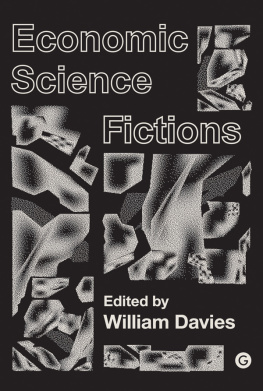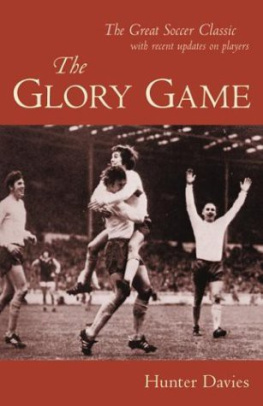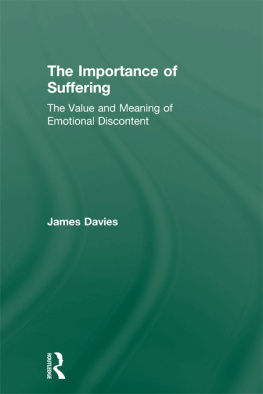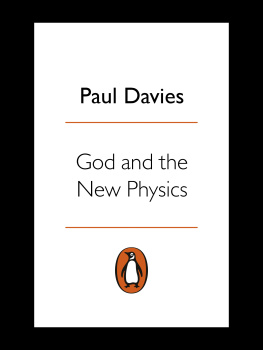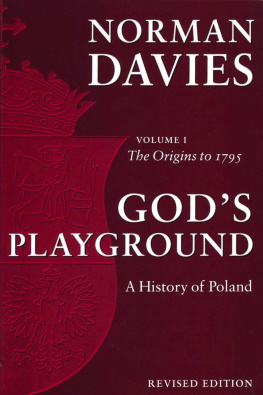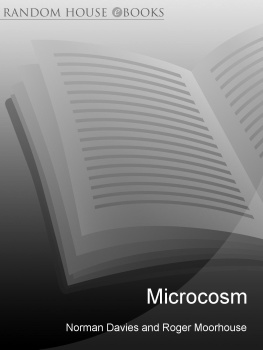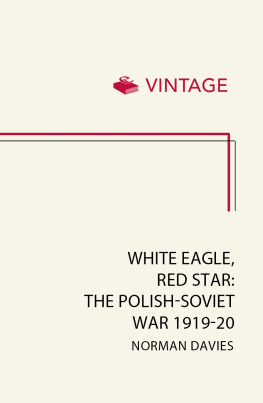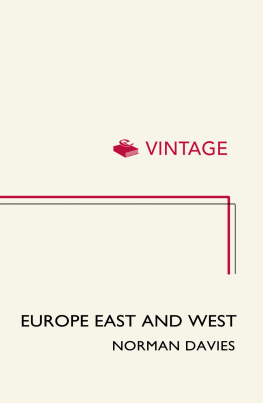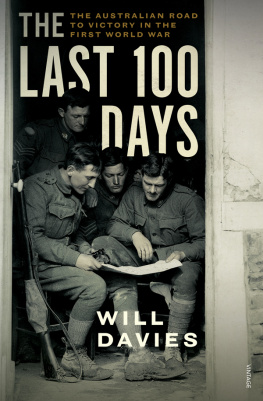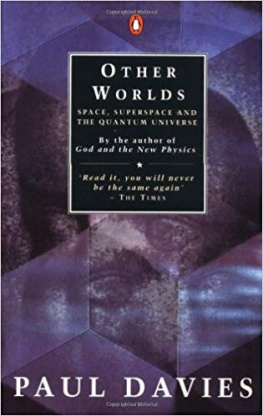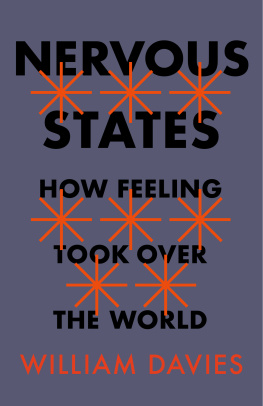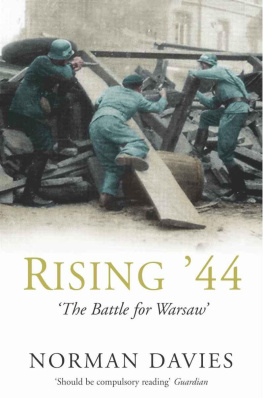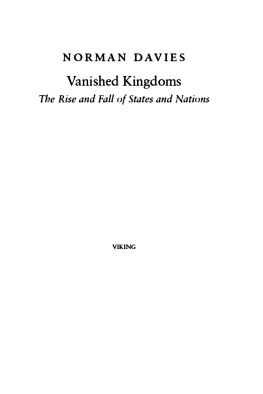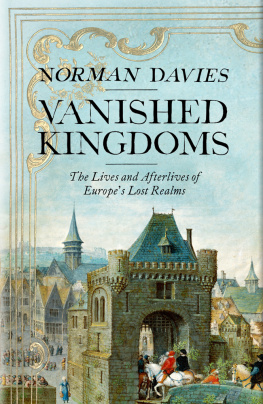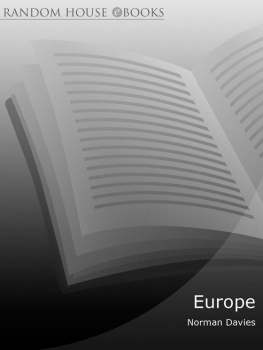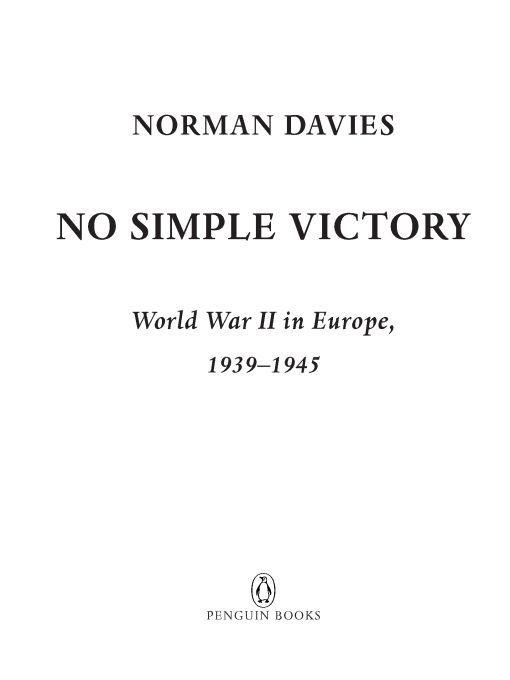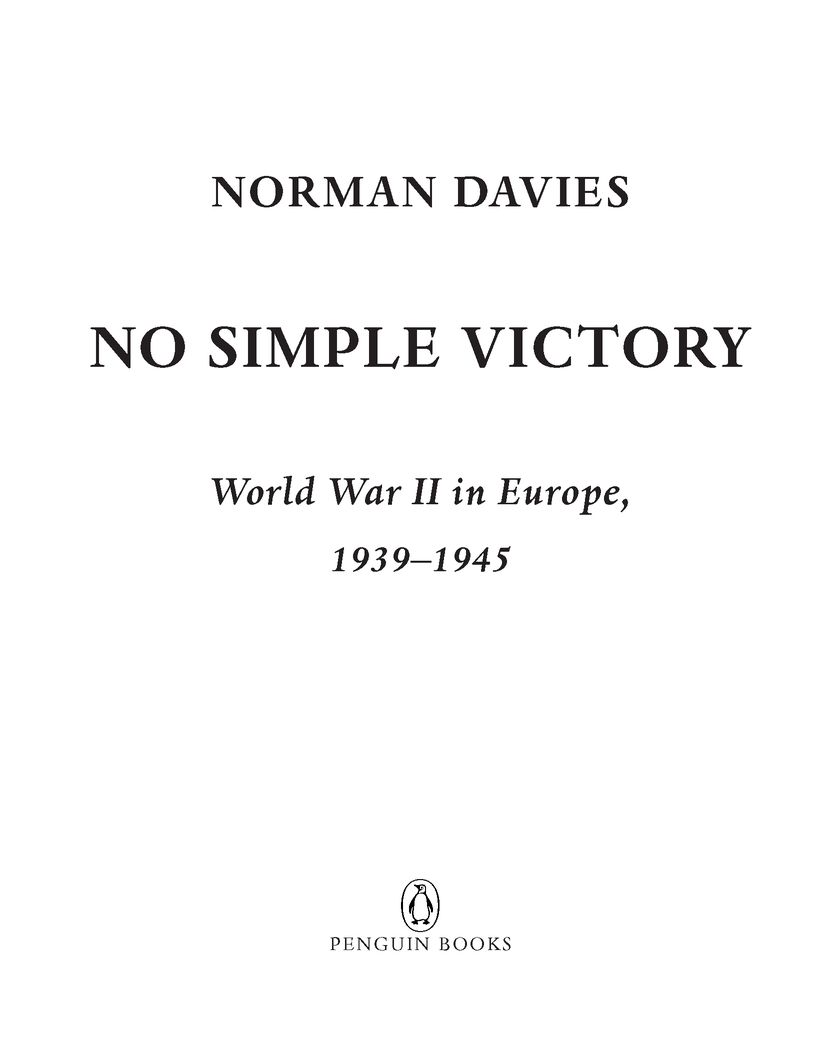Table of Contents
Praise for No Simple Victory
Its to the authors credit that he not only deconstructs the foundations of World War II history, but also explains how these misconceptions were built in the first place, giving a detailed account of the ways in which the war has been portrayed in film, art, and literature, and how this has subsequently affected public perception. Kirkus Reviews
[A] scathing reappraisal... Daviess topical approach judiciously surveys the military, economic, and political aspects of the war, often from an Eastern European perspective.... [He] cuts against the grain of popular war histories like Stephen Ambroses accounts of D-Day and the Bulge, but his interpretations rest on solid scholarly work.
Publishers Weekly
ABOUT THE AUTHOR
Norman Davies is the bestselling author of Europe: A History, The Isles: A History, and Rising 44. He is a Fellow of the British Academy, a Fellow of the Royal Historical Society, and professor emeritus at London University. He lives in London.
Introduction
OVER SIXTY YEARS HAVE passed since the end of the Second World War. And most people would assume that the broad outlines of that terrible conflict had been established long since. Innumerable books have been published on the subject. Thousands of films have been screened, portraying every aspect of military events and civilian ordeals. Countless memoirs of participants great and small have been collected. Hundreds of major monuments and scores of museums have been created to keep the memory of the war alive. One might think that there is nothing new to add. At least, one is tempted to think that way until one starts to examine what actually is said and what is not said.
The sixtieth anniversary of the end of the war was commemorated in 2005 in many different ways. In the United States, for example, a splendid new Memorial to World War Two was opened in Washington, DC, in advance of the anniversary. It takes the form of two linked oval concourses adorned with fountains, one representing the war in the Pacific theatre, and the other the war across the Atlantic. It stands in the pleasant park-land beside the obelisk of the Washington Monument, and opposite the National Holocaust Museum. And it invites visitors to stroll round the fountains and to contemplate the large numbers of inscriptions and high-minded quotations on the surrounding plinths. Over the gateway at one end one is the word PACIFIC, and over the gateway at the other end ATLANTIC. And the main inscription reads, WORLD WAR TWO, 1941- 45.
At this point, if not earlier, one begins to suspect that the memorial is not dedicated to the Second World War as a whole, but rather to the USAs involvement in the war. Almost any European would be able to point out that the war did not begin in 1941. But millions of Americans are being taught to think otherwise. The unwritten message states that the USA fought the good fight and won. At no point is any mention made of the USAs allies or comrades-in-arms. The unsuspecting visitor could be forgiven for thinking that the USA had won the war on its own.
The sixtieth-anniversary year, 2005, opened with an impressive ceremony in Poland marking the liberation of Auschwitz on 27 January 1945. Since the notorious German concentration camp had been built on German-occupied Polish territory, the President of Poland, Aleksander Kwaniewski, presided. And, since the camp had been liberated by the victorious Red Army, the President of the Russian Federation, Vladimir Putin, headed the list of foreign guests. Others present included the President of Israel, the President of Germany, President Chirac of France, and the chairman of the International Association of Roma. Most importantly, a diverse congregation of former prisoners attended, representing numerous nationalities, many of them wearing their pyjama-like prison uniforms. The assembled guests sat in the open, braving the freezing temperatures of a Central European winter. The speakers battled the snow flurries, and spoke many fine words such as Liberation, Triumph over Evil and Never Again. Many appropriate tributes were paid in memory of more than a million dead, the majority of them Jewish.
Yet at no point did anyone care to mention the realities of January 1945. No speaker mentioned the fact that, as Auschwitz was liberated, other ex-Nazi concentration camps were being used by the Soviet security forces to incarcerate a new wave of captives. Overwhelmed by the heart-warming concept of Liberation, almost all journalists present avoided the embarrassing topic of just how limited the liberations of 1945 really were. No one disturbed the peace by saying that the Nazi SS was not the only organization to run concentration camps during the Second World War. And no one cared to tackle the thorny question of defining what the universally condemned Evil actually consisted of.
On 9 May 2005 major celebrations were staged in Moscow. President Putin played host to fifty heads of state, including President George W. Bush, and presided over a grand military parade. Leading the tributes to the immense achievements of the Soviet armies in their triumph over Fascism, he declared that Victory Day marked a sacred date, the day that had saved the world. Then, standing in the same place where Joseph Stalin had led the victory parade in Red Square sixty years earlier, he gave the signal for the ceremonies to proceed. Thousands of troops dressed in the historic uniforms of the Red Army marched past, or rode past. Martial music of the war period blared out. And truckloads of bemedalled veterans from the Great Patriotic War, elderly men and women carrying flower-wreathed portraits of the Great Stalin, saluted the tribunes. It was all made to look as if time had stood still.
No one with a generous heart could object to that moment of recognition for the veterans. They, after all, had made the greatest sacrifices of all the combatant armies. Yet few foreigners noticed the political sleight of hand that was being practised. President Bush had made a telling point on the eve of his trip to Moscow when he had briefly visited Latvia, one of the three Baltic States which had been attacked and annexed by Stalin in 1940 and whose present-day presidents now felt unable to participate in the Moscow festivities. But, generally speaking, few commentators questioned the dubious historical assumptions that framed the occasion. They accepted, quite incorrectly, that the Great Patriotic War was just a Russian synonym for the Second World War, and, as a result, they were not prompted to ask what the Soviet Union was doing in the years before the Great Patriotic War started. They did not inquire too closely about Stalins methods or Stalins war aims. And, above all, they did not object to the quiet elision of the fifteen Soviet republics of 1945 with the Russian Federation of today.
President Yushchenko of Ukraine, the leader of the latest ex-Soviet republic to slip away from Moscows control, attended Mr Putins festivities. But Westerners were still so accustomed to mistaking Ukraine for part of Russia that they saw no reason to interest themselves in the fate of Ukraine in 1939-45 as opposed to that of Russia or of the USSR as a whole. President Yushchenko, modestly, did not make a show of the fact that his own father, a village schoolteacher, had been a survivor of Auschwitz (prison number 11369).


